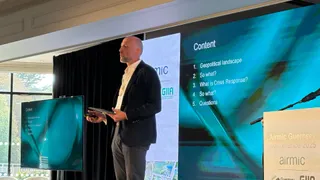
Geopolitics and special risks: a world on edge
At the Airmic Guernsey conference, Rob Harford (pictured), head of security response at Convex Risks, delivered a sobering assessment of the global risk environment during the breakout session “Geopolitics/Special Risks: It’s a scary world out there”.
Opening with a “health warning”, he reminded delegates that his subject matter was far from cheerful. Citing the Economist Intelligence Unit’s World Uncertainty Index, he highlighted how volatility has surged: “It sat around 20,000 since 2008, spiked to 60,000 during Covid, and is now over 100,000.” For Harford, this steep rise captures the extraordinary dynamism of today’s geopolitical landscape.
Harford’s survey began with Europe, where the war in Ukraine remains locked in stalemate. Despite small territorial shifts, he noted that “neither Russia nor Ukraine is likely to achieve their war aims”. Yet the conflict’s reach is widening, with drone incursions into Poland and Romania and Russian jets overflying Estonian airspace—tests, he argued, of NATO’s resolve. He also warned of rising tensions between Russia and Finland, drawing parallels with Moscow’s rhetoric before the invasion of Ukraine.
Turning to the Middle East, Harford described a cycle of conflict across Israel, Gaza, Lebanon, Iran, Syria and Yemen. Military responses alone, he cautioned, cannot solve insurgency or terrorism: “We are not at any place that is better … problems are being stored up for the future.” He urged delegates to consider the generational impact of conflict, particularly on young populations in Gaza and beyond.
In Asia, China’s pressure on Taiwan is intensifying. Military incursions into airspace and territorial waters have doubled between 2023 and 2024. Harford likened this to “boiling the frog”—gradual escalation that risks normalising aggression until it tips into blockade or invasion. The danger, he stressed, is not only deliberate conflict but also “unintended escalation” from miscalculation, citing a recent incident where two Chinese vessels collided during manoeuvres in the Philippines.
Across Africa, meanwhile, a surge of coups—13 attempted between 2021 and 2023, with eight successful—illustrates the fragility of many states. Harford listed ongoing conflicts in Sudan, Nigeria, Ethiopia, Mali and others, warning that instability fuels migration at crisis levels. This in turn strains host nations, fuels social tension, and drives the rise of far-right populism across Europe.
Harford situated these developments within a broader trend: the decline of US hegemony. As Washington reduces its global role, regional powers are colliding more directly, eroding the restraining influence of a single dominant state. Defence spending is rising, often funded by cuts to international aid—a dynamic that feeds the same cycle of instability, migration and tension.
Drawing a historical parallel, he warned that “many factors that precede major conflicts are higher now than they have been since World War Two”. While history does not repeat itself exactly, he argued that the similarities are “fairly alarming”.
For Harford, the key lesson for organisations is to focus on what can be controlled. Political instability, he said, correlates directly with criminal threats—kidnap, extortion and cybercrime among them. Convex has seen a threefold rise in cases over the past year, and notably, 40% of these occurred in the UK and Europe, not just in so-called high-risk regions.
Crisis response, he explained, is about ensuring a “safe and timely resolution” for clients facing their worst day. His team of 22 consultants draws on over 1,800 resolved cases, providing reassurance and expertise in the heat of incidents. Whether advising on ransom negotiations or guiding corporate crisis teams, their focus remains firmly on the client’s interest, legality, and continuity of operations.
Harford closed with a reminder: “You cannot control geopolitics. What you can control are the outcomes for your organisation.” In an era of rising uncertainty, that may be the most valuable lesson of all.
Did you get value from this story? Sign up to our free daily newsletters and get stories like this sent straight to your inbox.

